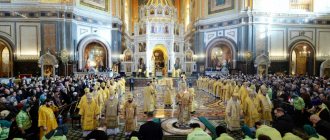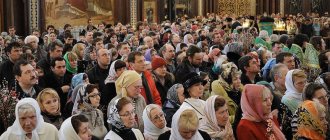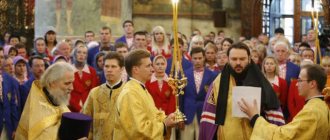Preparation for communion consists of physical, spiritual and prayerful preparation:
A brief scheme of preparation: fasting for three to seven days - the night before, attending a service in a church - a house of prayer - in the morning for confession - and at the end of the service, receiving communion.
Fast from 3 to 7 days (judge by your condition: someone can only do three days, and someone can do all seven). Usually those who rarely receive communion and skip fasts fast for 7 days. Those who take communion regularly fast for 3 days. Fasting means physical and spiritual fasting. This means: do not eat food of animal origin, do not participate in drinking and celebrations, spend your days more calmly, without fuss, take water more often, do not have relationships with your husband or wife, do not smoke, think more about sins and God. At the moment of communion, be in feminine purity.
What should you not do during Lent before Communion?
Archpriest Alexy Mindrov:
First of all, we must tune in to the fact that our fast should be both spiritual and physical. As for physical fasting, we must observe the measure that the fathers determined for us and maintain abstinence for three days. It is assumed that this is food abstinence, refusal of dairy and meat foods, and marital fasting, that is, refusal of intimacy between husband and wife.
We have identified foods (meat, milk), the consumption of which would be good to avoid during the period of preparation for Communion. But you need to try not to eat food that is difficult for the body, which means it significantly affects prayer.
Such a refusal is stressful for the body. But it is necessary. Because abstinence and prayer before Communion is a small sacrifice that we can make to God. That is why, I can say clearly and definitely, we must try to observe the canons of the Church. Otherwise, we will find ourselves in this state: we seem to be talking about love for God, but in fact we are deceiving ourselves and in reality we are not showing it at all.
Of course, a person may have some special circumstances. In this case, you need to talk to the priest and explain why fasting before Communion is not strictly observed. It happens that a person is sick, a woman during pregnancy or a nursing mother cannot fully fast on her own - she is entitled to relief.
When fasting before Communion, we must proceed from the fact that first of all we come to God, to His meal, which the Lord arranges for us out of His love. Therefore, on the one hand, you need to follow the rigor of the canons, and on the other hand, not lose the common understanding that for each person and for each case there must be an individual approach. Some have infirmities, some have health problems - everyone is different.
The most important thing is that there is no laziness of the soul. This is exactly what should not be done during the fast before Communion - allow carelessness, negligence, indifference.
The evening before communion
Preparation for confession takes place the evening after the service. It is important to concentrate, remember, realize and write down all your sins on a piece of paper. If you have any difficulties understanding sins, you can read the relevant literature or familiarize yourself with the main sins and their definitions on our website. You need to remember not only the sins that you commit every day, but also those that you committed earlier and have not yet confessed; this could be, for example, the fact that at school you teased or offended someone, or stole, and so on.
Fasting before Communion during Lent
Archpriest Alexy Mindrov:
I think that if we have the concept of fasting as a pure preparation, then it can be strengthened during that period. But to strengthen it with what? We already refuse dairy and meat foods at this time, and if it is the Assumption or Great Lent, then we also refuse fish. If a person sees that there is no difficulty in this for him, then he needs to look at what exactly is the difficulty for him? It happens that a person can refuse food, but not some addictions - alcohol, smoking, or other interfering habits. This is the most difficult moment for him. This means that you need to pay attention to it.
The question here is: what is our measure? Is it a product or is it really abstinence? The emphasis should be on abstinence.
I know that in Greece and Mount Athos, during the first three days of Lent, people abstain from food altogether. Such fasting is a special state. If you take a blessing from your confessor, then many people are quite capable of the experience of strict abstinence; I myself tried it in my youth and try to stick to it. But this should only be done with a blessing. And soberly assessing one’s strengths: since it is one thing to be a monk living in a certain rhythm of life, another is to be a mother of many children or, for example, a man who actively works most of the day.
Why do I put so much emphasis on blessing? Because arbitrariness does not lead to good. Either pride increases, or physical health becomes poor, and as a result, grumbling and discontent begin - and our spiritual life is upset. Because a person is a vessel that contains both soul and body.
That is, if possible, it is advisable to secure the blessing of a confessor and bow before God as the beginning of a feat. Because if we say that fasting is not a diet, but a spiritual path, then we need God’s help. And with God, bodily problems fade into the background.
Before bedtime
An hour and a half before the usual rhythm of going to bed, we open the prayer book (this is a book with a collection of prayers) and begin to read, but not just read, but pray, trying to understand the meaning of what is being read and said - of course, at first it may be difficult, I understand you perfectly. It’s good if the priest showed you in advance how and in what rhythm the prayer is read, and in what rhythm the canon is read. When a Christian understands these nuances, it will not be so difficult and dreary for him to pray. And later, when the text and method of reading are known, the canons will simply fly by with great spiritual joy.
PREPARING FOR COMMUNION IS EASIER THAN YOU THOUGHT
Exif_JPEG_420
Previously, people received communion without preparation. Then the rule grew and grew and now it is so big that it has turned into a wall between Christ and the believers. The wall between God and pregnant women, those who have given birth, those with many children, the weak, the sick, newborns and schoolchildren.
The devil has caught a bunch of people in this trap, who now think that Communion is only the reward of a righteous person who has “read everything.” And they don’t know that, first of all, this is salvation for the sinner. People think that it is necessary to fast for three days, read three canons, the Sermon, morning and evening prayers, make peace with everyone, be at the evening service, confess, come on an empty stomach, otherwise you cannot receive communion! I thought so too, until I became a priest.
Are there canons?
The canons and rules of the Orthodox Church require communion on an empty stomach (if the person is not dying) and abstinence from the marriage bed the day before. The canons do not indicate fasting, prayers and confession before Communion. This is a godly tradition. It helps a person to tune in.
Fasting before Communion
Three days of fasting are for those who have not received communion for a long time. If you receive communion once a week/month, fasting on Wednesday and Friday is sufficient. Yes, you don't need to fast on Saturday. Priests don't fast. Yes, and the laity were previously excommunicated from the Church for this, read Apostolic Canon 64: If anyone from the clergy is found fasting on the Lord’s Day, or on Saturday, with the sole exception of Holy Saturday: let him be expelled. If he is a layman: let him be excommunicated. . By the way, the rules of the apostles (8th and 9th) require excommunication from the Church both those who attended the Liturgy and did not receive communion, and those who have not received communion for 3 weeks.
Following to Holy Communion
It consists of two parts: I. Canon for Communion. II. Prayers before communion. These prayers began to appear in the 4th-6th centuries. In the time of John Chrysostom they were read while standing in a long line to the Chalice. In the 11th-12th centuries. Following became a practice in monasteries. And in the 14th century among the laity.
Reading the canon takes 15 minutes, prayers another 20. I do not allow an adult, healthy person to be without this canon. Because not finding 15 minutes to pray, in my opinion, is extreme disrespect for the Mysteries of Christ. But I no longer require it from schoolchildren. Here parents should stand with their child at home and say: “Pray with us a little before Communion.” It's on their conscience. I noticed that children are still embarrassed to pray themselves.
Three canons
Three canons, the Penitential Canon, the Mother of God and the Guardian Angel, entered the rule even later. I read it somewhere in the law. John of Kronstadt advice to priests: “Do not forbid parishioners to read the three canons, because this is a good pious folk tradition.” (I’m quoting from memory; whoever finds it, send me the link).
In the 1990s, this became the norm and now priests demand it. But some believe (including me) that making the reading of these canons and akathists a prerequisite for communion is incorrect. But I highly recommend reading them! To make it easier, spread them out over a week. Can be replaced by akathists and other canons. A person’s spiritual life should be interesting and varied. Sometimes I ask those who are taking communion for the first time and may not be able to master them not to read these canons.
Confession
In Orthodox Greece, it is rare that a priest is allowed to confess. Therefore, confession and communion are not connected in any way there and this is the norm. We are not allowed to go to the Chalice without confession. And this is good! So, a person from the street who comes to light a candle will not sin. But if you receive communion as it should, every Sunday, you don’t need to delve into yourself, looking for sins. Conscience does not condemn - just be blessed to receive Communion from a priest you know.
Good priests
More and more often I hear calls from priests to take communion often! And here are the words of the famous blogger, hereditary priest Pavel Ostrovsky: “When I communicate with newcomers, I tell them the following: “If you are at peace with everyone, if you believe in the Lord Jesus Christ, if you pray at church services, if you pray with all your strength and If you fast at home, then come on an empty stomach and receive communion.” And if you have a small child, then you can come to the service closer to Communion (15-20 minutes before the start) and receive communion with your child.” What sober and courageous words!
You must understand that there are different priests. Talk to the priest during confession, determine with him the frequency of communion and the size of the rule. If you do not find understanding, look for another priest. As they say, “everyone chooses for himself...”
conclusions
The whole meaning of spiritual life is in the Communion of the Body and Blood of Christ. If you are a faithful Christian and fast on Wednesday and Friday, then after reading the Sermon before communion and clearing your conscience in confession, you can proceed to the Chalice on an empty stomach. If you are pregnant or nursing, you cannot fast. If you can only come to the Liturgy with a child, find a priest who will give you communion together with the baby. If you are dying, not a single priest will require any preparation from you; he will come and give you communion. If you are healthy, try to read the canons and akathists during the week.
I wish everyone continuous and always worthy communion of the Holy Mysteries of Christ!
Priest Vladimir Panarin
After communion, be sure to read prayers of thanksgiving
After communion, with joy and sincere gratitude to God, we read the prayers “Thanksgiving for Holy Communion.” We do not spit or eat seeds or pistachios for the next 2 hours, so as not to accidentally spit out a piece of the tasted gifts. We try to spend the day without fuss, curses, in order to preserve the sanctifying power of Divine Grace.
PS I do not recommend that beginners prepare for Communion for the first time on major Church holidays, as you need to devote a lot of time. Therefore, please come, my dears, on weekdays or ordinary days, when there are not so many people.
Fasting before communion during the whole week
Archpriest Andrey Efanov:
A continuous week is a period when fasting is canceled. There are five of these a year - ten days after Christmas, two weeks (about the publican and the Pharisee and Cheese Week, during which everything is possible except meat) before Lent, Easter and Trinity Week before Peter's Lent.
During the continuous weeks preparing for fasting, communicants usually try to observe gastronomic abstinence before receiving the Sacrament. But on the festive holidays or on Bright Week it is allowed to receive communion without fasting, if the believer, together with the entire Church, has gone through a multi-day fast. However, there is no need to overeat on the eve of Communion. After all, even when fasting is canceled, gluttony still remains a sin. Also, during continuous weeks, as always, Eucharistic fasting is necessary - that is, refusal of food and drink immediately before the Liturgy (usually from 12 o'clock at night).
And always during fasting before Communion, we must remember that meat and milk themselves do not carry sin, but their consumption can make our attitude sinful. Every Christian can and should be told by his own conscience how to fast correctly.
Communion for children under 7 years old: rules, is it possible to eat, how does it happen?
If parents want to give communion to their child baptized in the Orthodox Church for the first time, they should consult with their confessor (priest). Preparing a child for the sacrament has its own characteristics and should take into account age, degree of church membership, and health. The child must wear a cross.
Children under 3 years old do not have to fast before communion. Starting from the age of 3, according to tradition, children are gradually taught to abstain from food and drink on the day of Holy Communion. Usually, kids easily get used to this. By the age of 7, the child should already be accustomed to observing the Eucharistic fast (complete abstinence on the day of communion, starting at midnight).
Children approach the Chalice first, then adults. Infants are placed lying down on the right hand to make it easier for the priest to feed with his right hand. After one year, babies are placed on the right hand. After 3 years of age, children fold their arms crosswise on their chest, the right one on top of the left (this is a symbol of meekness, like lambs). When the priest says, “The servant of God receives communion,” the child must say his baptismal name (or the parent says it for him).
We must teach the child to approach the Chalice with reverence (the fear of God), not to talk and not to turn around. The Lord can punish a child for disrespect. There was such a case in our temple: three girls about 11 years old stood in front of the Chalice, waiting for their turn, and chatted, laughed and twirled around the candlestick; and one girl's hair caught fire (she had a bushy ponytail at the back). It’s good that the teacher ran up and put it out.
Having received communion, the child must kiss the edge of the cup (like the Savior’s perforated rib), and the priest himself places the cup on the baby’s head. The main thing is not to cross yourself, not to make sudden movements, so as not to push the Chalice. The child must swallow a piece of the sacrament and go to the table, where they give him some water to drink and a piece of prosphora.
If the substance of the sacrament accidentally gets on your clothes, or if a child regurgitates the sacrament, then you must definitely tell the priest about it and do as he says. Usually this piece of clothing is cut out and burned.
Infants may be brought to the service directly for communion. Mothers who themselves prepared for the sacrament are usually blessed by the priests to receive communion with their children, although they did not attend the service.
A child must be accustomed to praying at the Liturgy gradually, as long as he can stand it, so as not to tire him and not cause disturbance to those praying in church. It is better to go out into the courtyard and take a walk there before the start of the Holy Meal.
When introducing their children, parents themselves should try to begin the Holy Mysteries, thereby setting an example for their children. A family is a small church where people go to God together and partake of the same Chalice.
Is it possible to smoke during Lent before Communion?
Archpriest Alexy Mindrov:
I know smokers who are so addicted that it is very difficult for them to give up a cigarette. I have repeatedly met people who are simply in weakness, and for them Communion is postponed for many years, because they understand that they cannot stand three days without a cigarette. I think in this case, the minimum period is the night before Communion. You should at least make it a rule not to smoke from 12 o’clock at night before Communion, and at least observe this.
Priest Vladimir Rusin:
If they ask me for my blessing to smoke, then I, of course, cannot bless smoking at all. But I know examples when people began to take communion regularly and suddenly noticed that they had stopped smoking. They unexpectedly discovered that the Lord had removed this need from them.
It’s difficult for me to talk about this topic, because I have no personal experience in dealing with this passion. From the very beginning, the Lord gave me an allergy to tobacco smoke, and in order to piss me off, it’s enough just to smoke somewhere nearby. Back in my student years, in the dormitory, I kicked smokers out of the room. But from the stories of those who struggled with this passion, I know that when they began to live an intense spiritual life and regularly receive communion, this habit was actually repressed.
Here, in the Russian Orthodox Church, unlike the Greeks, this illness has not taken such deep roots among the clergy and monasticism, therefore an example of purity is preserved. Smoking is difficult to explain by some natural need - a person does not need it. Inhalation may be necessary. But what are these smoking sticks for? Therefore, you can get rid of this addiction. But for this you need not only to constantly repent, but also to have the determination to quit smoking. There are enough examples when a person copes. According to former smokers, what often helped them was not pills or patches, but preparation for Communion.
Video about how communion takes place in church:
Watch the video about communion. From it you will learn what the sacrament of the Eucharist is, you will see how it takes place in the church.
The purpose and meaning of our earthly existence is to eliminate the consequences of original sin - corruption and mortality. With the help of faith in our Savior and the acceptance of His Flesh and Blood, we restore the original man within ourselves, transform ourselves and become like Christ God. “I commune with the mortal and become incorruptible” (from following the holy sacrament).
The Eucharist can be not only the “medicine of life” and the “medicine of immortality” for Christians, but also “poison” for those who partake unworthily.
What you can and cannot do after communion
Immediately after communion, you need to kiss the edge of the Chalice with the Holy Gifts; You cannot be baptized, so as not to push the Chalice, and you cannot venerate icons. And you need to go to the table, where the ministers serve warmth (wine with water or warm water) to the communicants in order to rinse your lips and swallow this warmth, so that the Body of Christ does not remain in your mouth. After the service you can kiss the cross and venerate the icons.
You need to listen to prayers of thanksgiving after communion and warmly thank the Lord for His Gift. If these prayers are not read in church, then read them at home. On the day of receiving the Holy Gifts, one must guard oneself from verbosity, idle talk, and vanity. Read spiritual literature. Try to retain the grace of the Holy Spirit within yourself for as long as possible in order to receive effective help in the fight against passions.
St. John of Kronstadt said: Do not be ungrateful, insensitive and indifferent to the Holy Mysteries. For feeling grateful, the Lord will send you more grace.
St. Nicodemus the Holy Mountain advises, after communion and thanksgiving, to talk with the Lord with humility: “Lord, you see my weakness and see how easily I fall into sin and cannot overcome passion; help me overcome it or defeat my enemy instead of me.”
Marital fast before Communion
Priest Dmitry Berezin:
Marital fasting before Communion is also a form of abstinence, the purpose of which is the primacy of the soul over the body. When preparing for the sacrament, we try to sweep away everything that prevents us from focusing on the spiritual.
Since this issue concerns both spouses, it is better to consult with your confessor on what to do. After all, it happens that only one of the spouses is a believer, and the second may have a very negative attitude towards such restrictions, and instead of peace there will be quarrels in the family. But this does not mean that in such situations you always need to indulge and find excuses for yourself.
Priest Vladimir Rusin:
I think that if both husband and wife are believers, then there are no problems with observing marital fasting. In a Christian family, all fasts can be observed by mutual consent.
But if one of the spouses does not adhere to fasts, then you need to discuss this intimate issue with your confessor and ask his advice. In such a situation, there may be some relief for one of the parties. But I think there should be at least a one-day fast, and it can be done.
If a husband and wife love each other, they will figure this out. The main thing is to be open to each other. Say: “I am preparing to receive communion.” - “Well, okay, get ready. And I’ll go and do other things for now. You say your prayers, and I’ll go night fishing,” for example.
The main thing is to actually go fishing, and not somewhere else. Because if there is a risk that the family may fall apart and this topic may become a stumbling block, then, of course, we need to remember the words of the Apostle Paul that marital fasting is observed only by mutual consent.
Do not depart from one another, except by consent, for a time, to practice fasting and prayer, and then be together again, so that Satan does not tempt you through your intemperance (1 Cor. 7:5).
Fasting before Communion for nursing mothers
Priest Dmitry Berezin:
For pregnant and breastfeeding women, food restrictions are relaxed, so fasting is not necessary. But if a woman feels fine, it would be right to limit herself on the eve of Communion, for example, in meat or something else.
According to canonical rules, a woman who has recently given birth may not abstain from fast food even during Lent. The rule of St. Timothy of Alexandria says: “Fasting is established to pacify our body. So, when the body is in humility and weakness, then it should take food and drink as it wants and can bear.”
Firstly, a woman who has recently given birth already has to comply with a number of restrictions. And secondly, she needs to restore her body and have enough strength and energy to cope with her maternal responsibilities.
I think every believing woman sees for herself whether and what opportunity she has to keep a food fast in one form or another before Communion. But the most important thing to remember is that fasting is not only about food.
Priest Vladimir Rusin:
For those who do not have the opportunity to fast fully before Communion - for those who are sick, pregnant, breastfeeding - the main thing during this period of preparation is increased attention to what is happening in the soul, to one’s small, unnoticeable sins. Just when the state of the body changes, a person may notice that he has become irritable, or has become lazy, or has begun to use his exceptional position, even abuse it somewhere, and demand special treatment. This is where selfishness and pride can manifest themselves. A person, concentrating on his own, stops noticing that someone nearby is sick, that it is difficult not only for him now, but also for others, and that there are many people around who are really having a hard time.
I am always amazed by such examples when, for example, a person is seriously ill, and at the same time he also labors somewhere with volunteers, and works to the best of his ability in the church, and always tries to help others as much as possible. And you see that the Lord strengthens such people. Not only physically, but, most importantly, spiritually.
After all, if you look around, each of us, to one degree or another, is now sick, infirm, and needs a special approach. Even children are discharged from the maternity hospital and practically no one is given a hundred percent health rating. But if we are alive, we have some part of health and strength. This means that we can bear each other’s burdens and take care of each other. Someone can help me, someone can help me. And when we are included in this chain, then grace flows through it, like electricity, and the light bulbs light up.











